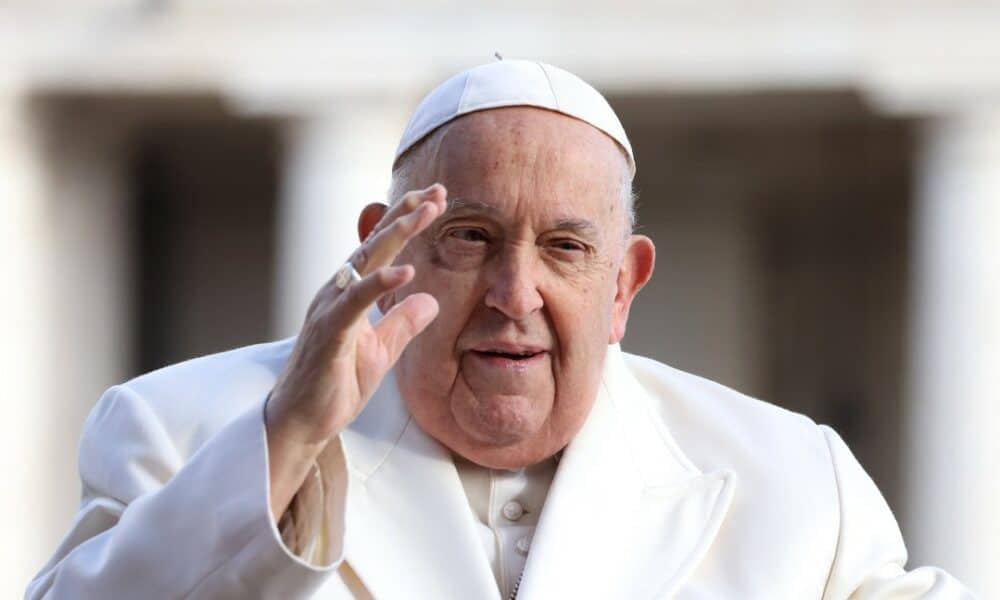The revelation of a resignation letter signed by Pope Francis more than a decade ago has once again come into the spotlight amid concerns about his health. The 88-year-old pontiff was recently admitted to Rome’s Gemelli Hospital after initially being diagnosed with bronchitis, which later developed into bilateral pneumonia. This situation has reignited discussions about the future of the papacy and the preventive measures Francis has taken to ensure the governance of the Catholic Church. The letter, handed to the then-Vatican Secretary of State, Cardinal Tarcisio Bertone, states that the Pope would step down if a medical condition prevented him from fulfilling his duties. While this information has been known since 2022, it now carries new significance given his current health condition.
The document was written and signed shortly after his election in 2013, with the goal of ensuring a structured transition should his health deteriorate to the point of preventing him from leading the Church. During an interview with the Spanish newspaper ABC in December 2022, the Pope himself confirmed the existence of the letter, explaining that he made the decision to avoid uncertainty in the event of permanent physical incapacity. He also stated that he considers such measures necessary for the stability of the Catholic Church.
Pope Francis’s recent hospitalization has raised significant concerns among the faithful and the global religious community. The Vatican has reported that he is improving but will remain under intensive medical care. This is not the first time the Pope has faced health issues since taking office, fueling questions about how long he will be able to continue leading the Catholic Church.
➡️ Papa assinou carta de renúncia há mais de 10 anos. Entenda
Papa Francisco assinou a carta de renúncia em 2013, pouco depois de ter sido eleito pontífice
Leia: https://t.co/YWQ2ChHsi4 pic.twitter.com/UEa64xwdv0
— Metrópoles (@Metropoles) February 21, 2025
History of Papal Resignations and Precedents in the Catholic Church
A papal resignation is a rare event in the history of the Catholic Church, but it is not without precedent. One of the most notable cases was that of Pope Benedict XVI, who abdicated in 2013, citing difficulties in fulfilling his mission due to advanced age. His decision came as a surprise and reshaped the understanding of the papacy, allowing Francis to take office. Before Benedict XVI, the last pope to resign was Gregory XII in 1415, during the Great Western Schism, a period of internal disputes over papal succession.
Other popes, such as Pius XII and Paul VI, also took similar precautions to those of Francis, drafting resignation letters to be used in extreme cases that rendered them incapable of leading the Church. These measures reflect a historical concern for maintaining leadership continuity and the stability of one of the world’s most influential religious institutions.
Pope Francis’s Resignation Letter and Its Impact on Church Governance
Francis’s decision to sign a preemptive resignation letter demonstrates his pragmatic view of Church governance. The Pope has reinforced the idea that resignation should not be seen as a taboo but as a legitimate measure to prevent institutional crises. The existence of this document ensures that, if he becomes permanently incapacitated, the transition to a new leader will be more organized and free of power vacuums.
Unlike his predecessors, who faced significant health challenges, Francis has publicly disclosed the existence of this letter, something that was uncommon in the past. This reflects his efforts to modernize the Church and make it more transparent. The revelation of the letter has also sparked discussions about possible future changes in how papal succession will be handled in the coming years.
Pope Francis’s Health Challenges
Since his election, Francis has faced several medical issues. In addition to his recent bilateral pneumonia, he underwent intestinal surgery in 2021 to treat diverticular stenosis, a condition affecting the colon. The Pope also suffers from chronic knee pain, which often forces him to use a wheelchair to move around. These health concerns reinforce questions about his ability to continue leading the Church effectively.
His hospitalization at Gemelli Hospital has renewed debates on whether a pope must be in full health to lead the Church. While doctors have reported that his condition is improving, the frailty of his health raises doubts about how long he can continue fulfilling his duties without major complications.
The Impact of a Possible Resignation by Pope Francis
If Francis’s resignation materializes, the Church will face one of its most significant moments in recent history. Choosing a new pontiff will require a conclave, the traditional process in which cardinals gather to elect the Pope’s successor. In Benedict XVI’s case, the resignation was planned and allowed for a relatively smooth transition. However, Francis’s resignation could have an even greater impact, given his popularity and the significant reforms he has introduced, such as measures against sexual abuse in the clergy and the expansion of interfaith dialogue.
Should he step down, the selection of his successor could lead to internal debates among cardinals regarding whether to continue Francis’s reforms or shift toward a more conservative leadership. This scenario could redefine the future of the Catholic Church for decades.
What Happens if a Pope Becomes Incapacitated?
If a pope is diagnosed with a condition that prevents him from exercising his role, there is no automatic succession mechanism. Canon law allows for papal resignation, but it does not provide clear guidelines on what should happen if a pope becomes incapacitated without a formal resignation. This gap has been debated among Church scholars, who argue that clearer regulations should be established for such cases.
Francis’s resignation letter can be seen as an individual solution to this issue. However, experts suggest that the Vatican may need to revise its rules to avoid uncertainties in cases where a future pope has not left a pre-written resignation document.
The Evolution of the Church’s Perspective on Papal Resignations
The concept of papal resignation has evolved over the centuries. For much of Church history, the idea of a pope stepping down was viewed as a sign of weakness or even an unacceptable act. However, Benedict XVI’s decision changed this perception, making resignation a viable alternative to ensure effective Church leadership.
Francis has advocated that resignation should not be seen as a problem but rather as an act of responsibility. He has publicly stated that if he ever feels his health prevents him from effectively leading, he will not hesitate to step down. This stance reinforces a new understanding of the papal role and may influence future decisions within the Vatican.
The Importance of Transparency Regarding the Pope’s Health
The disclosure of the resignation letter and regular updates on Francis’s health signal a shift in how the Church communicates these matters. In the past, information about a pope’s condition was often kept secret, leading to speculation and uncertainty. Today, there is an effort to make these details more accessible, allowing both the clergy and the faithful to follow developments more clearly.
This transparency also helps prepare the Church for potential leadership changes. If Francis’s health continues to decline, the existence of a pre-signed resignation letter could prevent internal crises and allow the Vatican to manage the transition in a more orderly manner.

The revelation of a resignation letter signed by Pope Francis more than a decade ago has once again come into the spotlight amid concerns about his health. The 88-year-old pontiff was recently admitted to Rome’s Gemelli Hospital after initially being diagnosed with bronchitis, which later developed into bilateral pneumonia. This situation has reignited discussions about the future of the papacy and the preventive measures Francis has taken to ensure the governance of the Catholic Church. The letter, handed to the then-Vatican Secretary of State, Cardinal Tarcisio Bertone, states that the Pope would step down if a medical condition prevented him from fulfilling his duties. While this information has been known since 2022, it now carries new significance given his current health condition.
The document was written and signed shortly after his election in 2013, with the goal of ensuring a structured transition should his health deteriorate to the point of preventing him from leading the Church. During an interview with the Spanish newspaper ABC in December 2022, the Pope himself confirmed the existence of the letter, explaining that he made the decision to avoid uncertainty in the event of permanent physical incapacity. He also stated that he considers such measures necessary for the stability of the Catholic Church.
Pope Francis’s recent hospitalization has raised significant concerns among the faithful and the global religious community. The Vatican has reported that he is improving but will remain under intensive medical care. This is not the first time the Pope has faced health issues since taking office, fueling questions about how long he will be able to continue leading the Catholic Church.
➡️ Papa assinou carta de renúncia há mais de 10 anos. Entenda
Papa Francisco assinou a carta de renúncia em 2013, pouco depois de ter sido eleito pontífice
Leia: https://t.co/YWQ2ChHsi4 pic.twitter.com/UEa64xwdv0
— Metrópoles (@Metropoles) February 21, 2025
History of Papal Resignations and Precedents in the Catholic Church
A papal resignation is a rare event in the history of the Catholic Church, but it is not without precedent. One of the most notable cases was that of Pope Benedict XVI, who abdicated in 2013, citing difficulties in fulfilling his mission due to advanced age. His decision came as a surprise and reshaped the understanding of the papacy, allowing Francis to take office. Before Benedict XVI, the last pope to resign was Gregory XII in 1415, during the Great Western Schism, a period of internal disputes over papal succession.
Other popes, such as Pius XII and Paul VI, also took similar precautions to those of Francis, drafting resignation letters to be used in extreme cases that rendered them incapable of leading the Church. These measures reflect a historical concern for maintaining leadership continuity and the stability of one of the world’s most influential religious institutions.
Pope Francis’s Resignation Letter and Its Impact on Church Governance
Francis’s decision to sign a preemptive resignation letter demonstrates his pragmatic view of Church governance. The Pope has reinforced the idea that resignation should not be seen as a taboo but as a legitimate measure to prevent institutional crises. The existence of this document ensures that, if he becomes permanently incapacitated, the transition to a new leader will be more organized and free of power vacuums.
Unlike his predecessors, who faced significant health challenges, Francis has publicly disclosed the existence of this letter, something that was uncommon in the past. This reflects his efforts to modernize the Church and make it more transparent. The revelation of the letter has also sparked discussions about possible future changes in how papal succession will be handled in the coming years.
Pope Francis’s Health Challenges
Since his election, Francis has faced several medical issues. In addition to his recent bilateral pneumonia, he underwent intestinal surgery in 2021 to treat diverticular stenosis, a condition affecting the colon. The Pope also suffers from chronic knee pain, which often forces him to use a wheelchair to move around. These health concerns reinforce questions about his ability to continue leading the Church effectively.
His hospitalization at Gemelli Hospital has renewed debates on whether a pope must be in full health to lead the Church. While doctors have reported that his condition is improving, the frailty of his health raises doubts about how long he can continue fulfilling his duties without major complications.
The Impact of a Possible Resignation by Pope Francis
If Francis’s resignation materializes, the Church will face one of its most significant moments in recent history. Choosing a new pontiff will require a conclave, the traditional process in which cardinals gather to elect the Pope’s successor. In Benedict XVI’s case, the resignation was planned and allowed for a relatively smooth transition. However, Francis’s resignation could have an even greater impact, given his popularity and the significant reforms he has introduced, such as measures against sexual abuse in the clergy and the expansion of interfaith dialogue.
Should he step down, the selection of his successor could lead to internal debates among cardinals regarding whether to continue Francis’s reforms or shift toward a more conservative leadership. This scenario could redefine the future of the Catholic Church for decades.
What Happens if a Pope Becomes Incapacitated?
If a pope is diagnosed with a condition that prevents him from exercising his role, there is no automatic succession mechanism. Canon law allows for papal resignation, but it does not provide clear guidelines on what should happen if a pope becomes incapacitated without a formal resignation. This gap has been debated among Church scholars, who argue that clearer regulations should be established for such cases.
Francis’s resignation letter can be seen as an individual solution to this issue. However, experts suggest that the Vatican may need to revise its rules to avoid uncertainties in cases where a future pope has not left a pre-written resignation document.
The Evolution of the Church’s Perspective on Papal Resignations
The concept of papal resignation has evolved over the centuries. For much of Church history, the idea of a pope stepping down was viewed as a sign of weakness or even an unacceptable act. However, Benedict XVI’s decision changed this perception, making resignation a viable alternative to ensure effective Church leadership.
Francis has advocated that resignation should not be seen as a problem but rather as an act of responsibility. He has publicly stated that if he ever feels his health prevents him from effectively leading, he will not hesitate to step down. This stance reinforces a new understanding of the papal role and may influence future decisions within the Vatican.
The Importance of Transparency Regarding the Pope’s Health
The disclosure of the resignation letter and regular updates on Francis’s health signal a shift in how the Church communicates these matters. In the past, information about a pope’s condition was often kept secret, leading to speculation and uncertainty. Today, there is an effort to make these details more accessible, allowing both the clergy and the faithful to follow developments more clearly.
This transparency also helps prepare the Church for potential leadership changes. If Francis’s health continues to decline, the existence of a pre-signed resignation letter could prevent internal crises and allow the Vatican to manage the transition in a more orderly manner.







